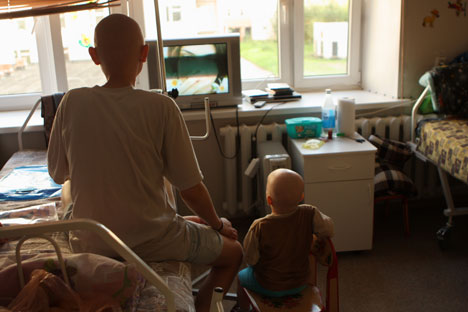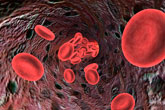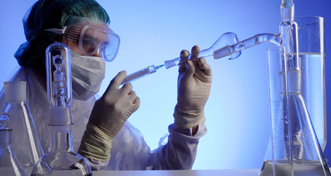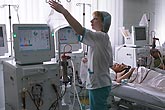What Russian scientists know about the cure for cancer

Scientists hope to bring the new drug to clinical trials in two years’ time. Source: ITAR-TASS
“Essentially, we synthesize new chemicals," said Anatoly Baryshnikov, head of the Institute of Experimental Diagnostics and Cancer Treatment. “We then study their ability to fight cancer, and turn them into usable drugs. One of the promising areas at the moment is chemicals derived from plants. They have a different mechanism of anti-cancer activity, and they are less toxic."
This promising new research is conducted at the institute's transgenic pharmaceuticals laboratory. The special plants grown in the lab produce “human” proteins that can fight cancer. This new drug is not expected to become a universal cure - but it does promise several key advantages over the existing treatments.
“This is our greenhouse,” said Ekaterina Kosobokova, one of the researchers working at the lab, as we walk into a small room full of plastic pots with little seedlings.
“This is Australian tobacco, which grows in the wild. It is similar to the tobacco plant which is used to make cigarettes," Kosobokova explained. “These are not genetically modified plants, which everyone is so afraid of. But they produce antibodies to the HER2 cancer protein. We are talking about chemicals that fight some types of cancer. These antibodies are already used in a cancer drug called Herceptin, which is very expensive. There are no locally-made versions of that drug on the Russian market. We hope that these plants will help us to produce a much cheaper version of the same chemical, which may also have other important advantages."
Scientists first create specially modified bacteria whose genetic makeup forces the tobacco plant’s leaves to produce the anti-cancer protein. The leaves infiltrated by these bacteria are no different from all the others. The only distinctive thing about them is the tiny circles left by the jet injector that was used to plant the bacteria. The leaves are then harvested, and the protein they produce is purified from the biomass.
“Similar research is under way in Germany,” Kosobokova said. “There are some companies in the United States that are on the verge of launching these new drugs. But so far, there are no actual drugs of this type on the market."
The Russian lab hopes to bring its new drug to clinical trials in two years’ time. Its antibodies have already proved effective against breast and ovarian cancer.
“There are many different kinds of cancer,” says Vyacheslav Kosorukov, the head of the laboratory. “All the available treatments can do is increase the percentage of people who survive the specific kind of cancer any particular drug is effective against.”
“I believe in our scientists," said Sergey Strazhev, head of the No. 3 Cancer Clinic in Moscow. “I believe in their skill, their inventiveness and ingenuity. I have been working for a long time, I've seen many patients. There are those who get major side effects from Russian-made drugs, and there are also those who have the same kind of reaction to imported medicines. It all depends on the specific case; Russian-made drugs can be just as good."
More from RBTH’s interview with scientists from the Institute of Experimental Diagnostics and Cancer Treatment:
RBTH: So you can’t actually cure cancer, you can only keep the tumor under control?
Vyacheslav Kosorukov: People sometimes think that a medicine is something you take and get cured right away. But even your regular painkillers are effective in only 90 percent of the patients; for the remaining 10 percent, they make no difference. So talking about breast cancer, all we can hope for is to produce an effective treatment for those 30 percent of the patients whose cancer has the HER2 protein marker. The remaining 70 percent of breast cancer patients don't have that protein, so they need some other drug. And then of course, there are some cases where none of the available drugs are effective.
RBTH: So you can offer a cure only for some, but not others?
V.K.: We are not even talking about a cure. We are talking about remission. Those who have had cancer in the past are at a very high risk of developing a tumor once again. We get phone calls from dozens of people, all asking us for help. Then we have to explain that the patient in question is male, while the drug we are developing is only effective against breast cancer. So can you please explain to your readers that there is simply no such thing as a ‘cure for cancer’?
People need to understand that there are hundreds of different drugs, and each one is effective only against some particular kinds of cancer. There are dozens of research centers in our country that are looking for new cancer treatments. Foreign companies are spending billions of dollars on such research, in the hope of earning even more from selling these treatments.
RBTH: And what if someone ever invents a real super-drug that cures cancer,” I say to the head of the institute, will it cost millions?
Anatoliy Baryshnikov: No it won't, if it can cure everyone, then it will sell by the million. It will be like a Kalashnikov assault rifle: it’s cheap because it's sold by the million; economies of scale kick in. Every year about 600,000 people get cancer. According to the World Health Organization forecast, by 2025 one in every three people on this planet will develop cancer at some point in their lives. And we are certainly heading in that direction. The thing to understand is that it's impossible to cure cancer using only pharmaceuticals. That's exactly why we now have about 100 different types of cancer drugs.
All the types of chemicals that could theoretically be effective against cancer have already been studied, more or less. There is no point pinning our hopes on them. The only area where progress is still being made is new ways of administering and delivering drugs, because they can make the chemicals themselves more effective.
RBTH: So what are the goals facing the people working on cancer treatments?
A.B.: Scientists always set lofty goals for themselves. On the whole, however, in this day and age drugs are made by pharmaceutical companies, or the companies commission someone else to make the drug. That's the situation here in Russia and all over the world. And knowing that the drugs are made by companies, what is the main objective of any company? The objective is to make money.
RBTH: Mr. Baryshnikov, if your lab were to receive all the money you needed, could your scientists invent a genuine cure for cancer?
A.B.: Who knows? Russians are smart people. They often come up with completely unexpected solutions, completely unexpected ideas. If only...
All rights reserved by Rossiyskaya Gazeta.
Subscribe
to our newsletter!
Get the week's best stories straight to your inbox


